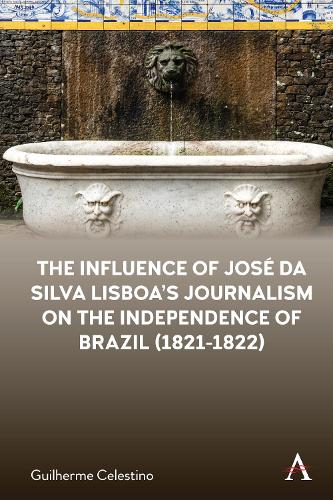
The Influence of Jos da Silva Lisboas Journalism on the Independence of Brazil (1821-1822)
(Hardback)
Publishing Details
The Influence of Jos da Silva Lisboas Journalism on the Independence of Brazil (1821-1822)
By (Author) Guilherme Celestino
Anthem Press
Anthem Press
1st November 2022
United Kingdom
Classifications
Professional and Scholarly
Non Fiction
National liberation and independence
Right-of-centre democratic ideologies and movements
981.033
Physical Properties
Hardback
240
Width 153mm, Height 229mm, Spine 26mm
454g
Description
This work analyses the impact of the publications written by the economist, jurist, administrator and historian Jos da Silva Lisboa, the future Viscount of Cairu, from 1821 to 1822, on the events that led to the Independence of Brazil in 1822. It reassesses the many interpretations of his role throughout the period, repositioning him among those who are part of the broad reformist Catholic Enlightenment. Although a supporter of Brazilian autonomy, a fierce critic of the Cortes of Lisbon and an important figure in the events that unfolded after the departure of Dom Joo VI from Rio de Janeiro in 1821, he would not openly embrace the Independence from the United Kingdom with Portugal and would instead work towards a solution that would encompass Brazils autonomy within a Portuguese Empire, which did not take place.
Reviews
By inquiring into Jos da Silva Lisboas role in the process of Independence, Guilherme Celestino seeks to re-evaluate the conventional position he has occupied for such a long time in Brazilian historiography a conservative or a reactionary in order to give a new interpretation of the role played by this man. And so, a convinced monarchist emerges, defender of the House of Braganza, who was guided by the Portuguese Enlightenment preaching the renewal of institutions through gradual reform. A book destined to be a reference for studies on the Independence period and on Silva Lisboas own thinking Lucia Bastos P. Neves, Professor ofModern History at Universidade do Estado do Rio de Janeiro, Brazil
The histories of Ibero-American independences have been too attached to analyses tied to the Anglo-Saxon paradigm of the era of revolutions. Celestinos book is in this sense a breath of fresh air, not only because it suggests alternatives to the interpretative canon but also because it opens new avenues for thinking about and articulating concepts and facts that have been conventionally contested. An original, daring and undoubtedly stimulating work Isabel Corra da Silva, Research Fellow at Instituto Cincias Sociais, Universidade de Lisboa, Portugal.
Guilherme Celestinos exquisite work is fundamental for us to understand several crossroads of Brazilian society, both at the beginning of the Empire and today. Silva Lisboa is more present than ever, in many representations and practices of today. Guilherme escapes the spectrum of pragmatic and conservative evocations of the Viscount of Cairu, to observe him almost side by side, as he invited the economist to walk in the garden of the modern approach and highly qualified research, a work developed with great responsibility. Carlos de Faria Jr., Lecturer of Economic History and Economic Formation of Brazil, Universidade Federal de Juiz deFora, Brazil
Author Bio
Guilherme Celestino is a historian of political ideas with a PhD in Portuguese and Brazilian studies from Kings College London andalso a former visiting fellow at Instituto de Cincias Sociais, Universidade de Lisboa.
